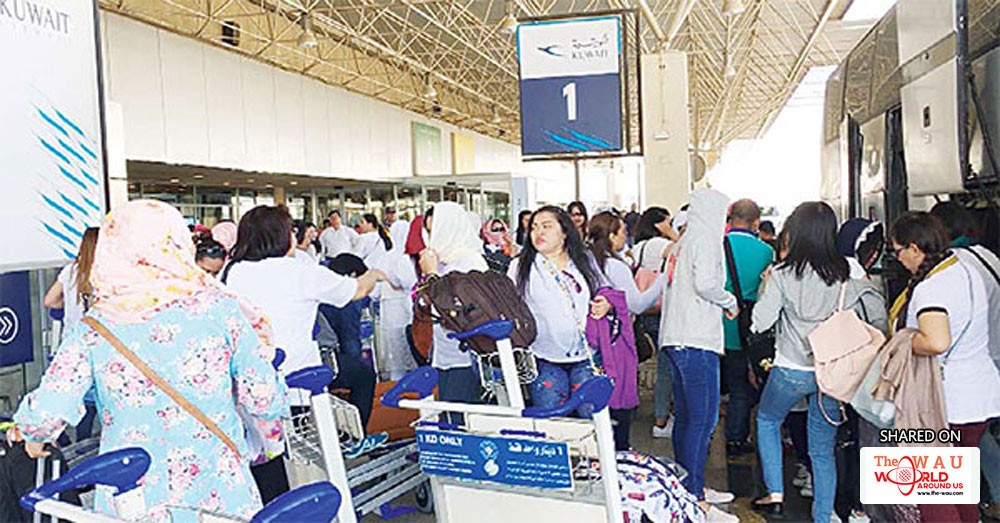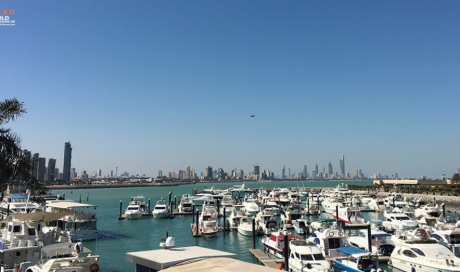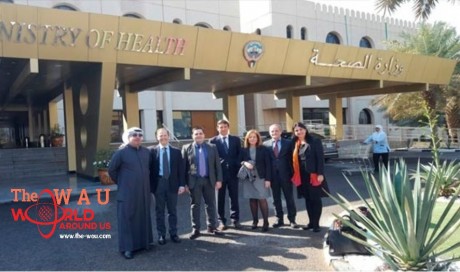The Philippines Monday expanded a ban on its citizens working in Kuwait after President Rodrigo Duterte angrily lashed out at the Gulf state over reports of Filipino workers suffering abuse and exploitation. Authorities say 252,000 Filipinos work in Kuwait, many as maids.
They are among over two million employed in the region, whose remittances are a lifeline to the Philippine economy. But Labour Secretary Silvestre Bello Monday announced a “total ban” on new employment in the country, including Filipinos who had already obtained employment permits but had not yet left for the wealthy oil-producing country. Authorities have not ruled out revoking the permits of Filipinos currently working in Kuwait or of previous hires returning on new contracts.
“With the advent of the series of reports involving abuses and deaths of overseas Filipino workers in Kuwait, a total ban on deployment of all overseas workers … is hereby enforced,” Bello said, reading an order.
“This order takes effect immediately.” The move would affect thousands of workers, labour spokeswoman Abegail de Vega said. The fresh move came after Duterte last month barred Filipinos from seeking work in Kuwait, although the ban exempted those who had already secured permission. Last Friday Duterte hit out at Kuwait as he brandished photos reportedly of a Filipina maid found in a freezer, saying she had been “roasted like a pig”.
Duterte has been vocal on the issue of abuse of Filipinos in the Middle East, even threatening a ban on citizens working anywhere in the region. He also alleged Arab employers routinely raped their Filipina workers, forced them to work 21 hours each day and fed them scraps. “Is there something wrong with your culture? Is there something wrong with your values?” he had said, addressing Kuwait.
Kuwait’s embassy in Manila declined to comment. Accounts of Filipinos being subjected to abuse, overwork, rape or dying in suspicious circumstances in the region have long circulated. The Philippine foreign affairs department said Monday authorities were repatriating 10,000 overstaying Filipinos from Kuwait, taking advantage of an amnesty programme arranged with the Kuwaiti government. Officials added they were eyeing China and Russia as “alternative markets” for overseas workers.
Mixed reactions
The total ban has, meanwhile, generated varied reactions from OFWs in Kuwait. One of those who were happy of the total deployment ban was Remy, the neighbour of Joanna Daniela Demafelis, the Filipina household service worker whose body was found inside the freezer. “I fully support the total ban. I don’t encourage Filipinos to come here to work as housemaid. What if they end up with barbaric employers like the employers of Joanna,” stated Remy.
Others were saddened upon reading the news on the social media. “Not all Kuwaitis are bad. My employer has been very good to me. I had cancer and my employer took care of my treatment till I got well. I’ve been receiving my salary continuously and they are all supported me. It should have been case to case basis,” pointed out Terzery who works at a Kuwaiti household.
Meanwhile, Filipino skilled workers or those who are under visa 18 were taken by surprise of the total deployment ban. “Why include us? We have good jobs here. My husband is working here and our two kids are studying here. Skilled workers are okay. Yes, we all know that household service workers are vulnerable to abuses. If we go home now, can they give us a good job? Do they have any concrete plan for all the affected skilled workers?” lamented Mildred Lacson.
Other Filipino organisations and OFW advocates also aired their dismay on the brazen decision of the government. “The skilled workers should have not been included. We enjoy full protection under the Kuwait Labour Law plus there’s already an existing Memorandum of Understanding on Labour Cooperation for skilled workers signed by Kuwait and the Philippines in 2012.
Our government should look into this,” appealed Ana Del Mundo, the founder and Vice-Chair of the Philippine Society of Marketing Specialists in Kuwait. “We are dismayed and saddened of this development. We hope Secretary Bello reconsider his decision of including the skilled workers in the total ban though we understand and fully support our government’s stance in protecting all Filipino workers in Kuwait,” stated Dr Chie Umandap, the founder of Ako OFW in Kuwait, an OFW advocacy group.
Meanwhile, Philippine Ambassador to Kuwait Renato Pedro Villa advised all Filipino nationals who have valid visas and enjoy good working condition to stay put and postpone all vacation plans. “We are advising them not to go home now for they cannot come back because of the total deployment ban. Those who are vacationing now in the Philippines cannot come back for now because of the total ban till further notice,” explained Villa. Along the same line, some companies in Kuwait with a huge number of Filipino employees issued circular asking them to postpone their leave. Some airline companies have also informed their Filipino cabin crew that they will not be included in the roster of flights to Manila until further notice due to the ban.
Meanwhile, the repatriation of undocumented OFWs continues with the second batch composed of 300 repatriates flew to Manila on Tuesday night. There are around 10,000 undocumented Filipino workers in Kuwait based on the records of the Ministry of Interior and the embassy is targeting to repatriate at least 7,000 undocumented OFWs. The Ministry of Interior has already issued more than 2,000 exit clearances to those who applied for amnesty.
Shocking statements
A group of Filipino workers returning from Kuwait to their country made shocking statements to the Philippine People’s Television correspondent claiming that they had been subjected to coercive conditions during their stay and work in Kuwait, reports Al-Anba daily.
Although most of these workers left Kuwait for the Philippines, taking advantage of the amnesty issued by the Kuwaiti Ministry of Interior, many of them used Duterte’s statements to ban travel of workers to Kuwait and to allow them to return to their country at the expense of the state and provide them with financial assistance. In televised statements one of the Filipinas said she worked in Kuwait as a maid for only nine months. “The employer used to hit me and hit my head against the wall and I reached a point where I could not take it anymore.”
“They treated me like an animal and they threw food at me. They would not even call me by my name,” said another Filipina. Yet another Filipina, identified only as Fatima said: “I worked for 5 years in Kuwait, and the result was they put me in jail for two years after accusing me of stealing.” After interviewing a group of workers, the TV correspondent commented saying there are still some 7,000 Filipino workers in Kuwait and added her government plans to return them to the Philippines.
Meanwhile, one of the Philippine senators has asked the Philippine embassy in Kuwait and the ministries of Foreign Affairs, Labor and Employment in his country to take responsibility for ensuring the safety of Filipino workers in Kuwait. However, it is largely believed there is no iota of truth in what has been mentioned by the Filipino domestic workers after arriving in their country.
Employers ID’d
Authorities have identified the employers of Joanna Daniela Demafelis, the Filipina household worker whose body was found in a freezer, as Lebanese Nader Issam Assaf and his Syrian wife Mona Hassoun. Al Arabiya English said in a report published on its website Monday that the Interpol is now looking for the employers of Demafelis. It has been reported that the couple and their two children left the country in November 2016, while the body of Demafelis was discovered recently when the owner of the apartment obtained permission from the court to enter the apartment.
Initially, the officers tasked to investigate the case thought the suspects were staying in Lebanon but a report published by Al-Rai daily disclosed they are in Syria. The daily also revealed that Assaf filed a missing report on Demafelis two days before leaving the country. Assaf reportedly grew up in his paternal aunt’s house in Beirut. His relatives think he is being controlled by his wife, indicating he cannot even smoke in front of her. Assaf’s aunt told Al-Rai daily that she raised him after his father left his mother. “It’s impossible. My nephew would never kill anyone,” she stressed.
“The last time we saw him was around two years ago when he came for his father’s funeral. He then returned to Kuwait and we later learnt that he went to Syria,” she added. “Maybe his wife is behind the crime. She is edgy and he always feared her. He once let her kick his mother from their house in Kuwait,” Assaf’s cousin said. His relatives added that Assaf’s mother once visited him in Syria and when she returned she told them that he looked “mentally unstable.”
Meanwhile, Filipino officials continue to comment on the decision of Duterte to stop sending workers to Kuwait. Manila Bulletin published a report on its website Monday quoting Senator Ralph Recto as saying that the government must provide “prompt care” for Filipino workers returning from Kuwait. He stressed the need for the government to help Filipinos working in Kuwait, taking into consideration the value of their remittances. In a press statement, Recto said these workers are not sending small amount to the country such that their remittances “help keep the economy afloat.”
He cited as an example the remittances of Filipinos working in Kuwait last year which reached P40.6 billion. He added this amount exceeds the earnings of large companies in the Philippines; pointing out that if these Filipino workers were a company, they would have been ranked as the 37th biggest in the country. He went on to say, “This financial contribution to their homeland makes them deserving of government care, whether repatriation or legal help if they are still there, and employment and livelihood assistance once they are home for good.”
Moreover, globalnation.inquirer.net has quoted Department of Foreign Affairs (DFA) Secretary Alan Peter Cayetano as saying, “Our efforts to protect our fellow citizens will not end with the imposition of deployment bans or the repatriation of our workers in countries where they are prone to maltreatment. We will also go after illegal recruiters, human traffickers and other modern-day slave traders who continue to victimize our people.” — english.alarabiya.net, news. mb.com.ph and globalnation.inquirer. net
Share This Post












